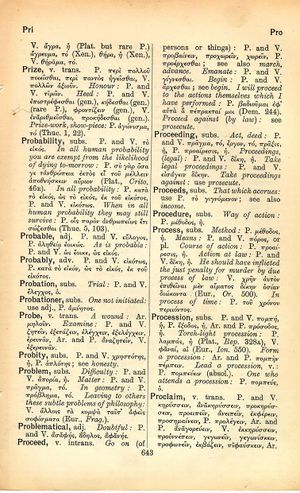proceed: Difference between revisions
From LSJ
τῶν Λειβηθρίων ἀμουσότερος → more uncultured than Leibethrans, more uncultured than the people of Leibethra, lowest degree of mental cultivation
(Woodhouse 4) |
(CSV4) |
||
| Line 1: | Line 1: | ||
{{ | {{Woodhouse1 | ||
| | |Text=[[File:woodhouse_643.jpg|thumb|link={{filepath:woodhouse_643.jpg}}]]'''v. intrans.''' | ||
<b class="b2">Go on</b> (of persons or things): P. and V. προβαίνειν, προχωρεῖν, χωρεῖν, P. προέρχεσθαι; see also [[march]], [[advance]]. | |||
<b class="b2">Emanate</b>: P. and V. [[γίγνομαι|γίγνεσθαι]]. | |||
<b class="b2">Begin</b>: P. and V. ἄρχεσθαι; see [[begin]]. | |||
<b class="b2">I will proceed to the actions themselves which I have performed</b>: P. βαδιοῦμαι ἐφʼ αὐτὰ ἃ πέπρακταί μοι (Dem. 244). | |||
<b class="b2">Proceed against</b> (<b class="b2">by law</b>): see [[prosecute]]. | |||
}} | }} | ||
Revision as of 09:49, 21 July 2017
English > Greek (Woodhouse)
v. intrans.
Go on (of persons or things): P. and V. προβαίνειν, προχωρεῖν, χωρεῖν, P. προέρχεσθαι; see also march, advance. Emanate: P. and V. γίγνεσθαι. Begin: P. and V. ἄρχεσθαι; see begin. I will proceed to the actions themselves which I have performed: P. βαδιοῦμαι ἐφʼ αὐτὰ ἃ πέπρακταί μοι (Dem. 244). Proceed against (by law): see prosecute.

